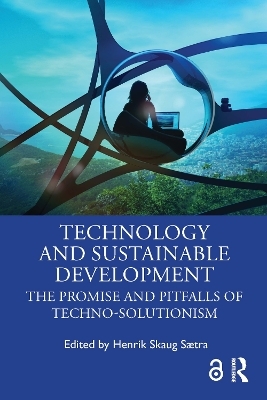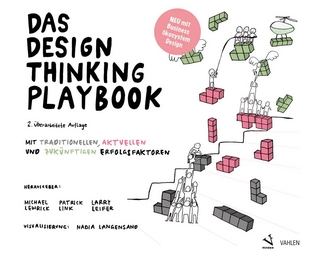
Technology and Sustainable Development
Routledge (Verlag)
978-1-032-35056-1 (ISBN)
Technological change is at the core of all major disruptions in human history, and
revolutions, wars, and general development are regularly connected to some sort of
technological change. However, not all development is beneficial. While technology has
fueled great innovations and rapid development, the notion of sustainable development
has gained prominence as we now experience serious social, economic, and environmental
challenges.
This book examines whether technology can be used to fix the very problems caused by
technology, as the various chapters examine different aspects related to how technology
has brought us where we are today (which some will say is the best place humanity’s been at
according to a range of metrics), and whether technology helps or hinders us in our efforts
to solve the challenges we currently face. The issues discussed cover the three sustainability
dimensions and include topics such as the materiality of AI, technology in education, AI
for gender equality, innovation and the digital divide, and how technology relates to power,
the political system, and capitalism. The chapters all build on the theoretical backdrop of
technological change, sustainable development, and the UN’s Sustainable Development
Goals are actively used throughout this book, both to examine how these goals capture or
overlook central elements of sustainable development, and also to facilitate and create a
common framework of engagement between the chapters.
This book provides a novel combination of traditional theories that are explored
through different case studies, providing the ground for a better understanding of how
and when technology can – and cannot – be the enabler of sustainable development.
It is thus an important resource for students of all disciplines, technologists, and those
developing and applying new technologies. It is also a valuable resource for politicians
and regulators attempting to harness the power of technology for good, while limiting its
negative potential.
The Open Access version of this book, available at www.taylorfrancis.com, has been
made available under a Creative Commons [Attribution-Non Commercial-No Derivatives
(CC-BY-NC-ND)] 4.0 license. Funded by Østfold University College.
Henrik Skaug Sætra is a political scientist with a broad and interdisciplinary background and approach, mainly focusing on the political, ethical, and social implications of technology. He focuses specifically on the sustainability-related impacts of AI and has previously published a book and several articles on AI and the UN’s Sustainable Development Goals.
Chapter 1 ◾ Introduction: The Promise and Pitfalls of Techno-solutionism
Henrik Skaug Sætra
Chapter 2 ◾ Key Concepts: Technology and Sustainable Development
Henrik Skaug Sætra
Chapter 3 ◾ Artificial Intelligence, Artificial Solutions: Placing the Climate Emergency at the Center of AI Developments
Benedetta Brevini
Chapter 4 ◾ Sustainable Climate Engineering Innovation and the Need for Accountability
Marianna Capasso and Steven Umb rello
Chapter 5 ◾ Shinigami Eyes and Social Media Labeling as a Technology for Self-care
Henrik Skaug Sætra and Jo Ese
Chapter 6 ◾ Lessons to Be Learnt? Education, Techno-solutionism, and Sustainable Development
Neil Selwyn
Chapter 7 ◾ Virtual Reality and Autism
Anders Dechsling and Anders Nordahl-Hansen
Chapter 8 ◾ The Technologically Sustained Digital Divide
Erlend Ingridsønn Nordrum
Chapter 9 ◾ Spot on SDG 5: Addressing Gender (In-)equality Within and With AI
Marisa Tschopp and Hanan Salam
Chapter 10 ◾ A Legal Sustainability Approach to Align the Order of Rules and Actions in the Context of Digital Innovation
Eduard Fosc h-Villaronga, Hadass ah Drukarch, and Marco Giraudo
Chapter 11 ◾ Governing Toward Sustainable Development: From a Path-Dependent Transition to a Disruptive One
Lilja Mósesdóttir and Ivar Jonsson
Chapter 12 ◾ Capitalism, Sustainability, and Democracy
Harald Borgebund
Chapter 13 ◾ Nudging Policy or Crowding It Out? Green Nudges as Ideational Technologies
Stuart Mills and Richard Whittle
Chapter 14 ◾ The Fallacy of Disruptive Technologies and the Primacy of Politics: Sustainable Development Goals as an Example
Imad Antoine Ibrahim
Chapter 15 ◾ Technology and the Distribution of Power
Faridun Sattarov
Chapter 16 ◾ What Does Data Valuation Literature Tell Us About Methods and Dimensions? Implications for City Data Marketplaces
Petter Kvalvik, Mary Sánchez-Gordón, and Ricardo Colomo-Palacios
Chapter 17 ◾ Techno-solutionism Facing Post-liberal Oligarchy
Ivar Jonss on and Lilja Mósesdóttir
Chapter 18 ◾ The Role of Technology in Alternatives to Growth-Based Sustainable Development
Henrik Skaug Sætra
Chapter 19 ◾ Conclusion: The Promise and Pitfalls of Techno-solutionism for Sustainable Development
Henrik Skaug Sætra
| Erscheinungsdatum | 17.04.2023 |
|---|---|
| Zusatzinfo | 3 Tables, black and white; 6 Line drawings, black and white; 7 Halftones, black and white; 13 Illustrations, black and white |
| Verlagsort | London |
| Sprache | englisch |
| Maße | 178 x 254 mm |
| Gewicht | 700 g |
| Themenwelt | Informatik ► Software Entwicklung ► User Interfaces (HCI) |
| Recht / Steuern ► Privatrecht / Bürgerliches Recht ► IT-Recht | |
| Sozialwissenschaften ► Soziologie ► Spezielle Soziologien | |
| Technik ► Elektrotechnik / Energietechnik | |
| Technik ► Umwelttechnik / Biotechnologie | |
| ISBN-10 | 1-032-35056-3 / 1032350563 |
| ISBN-13 | 978-1-032-35056-1 / 9781032350561 |
| Zustand | Neuware |
| Informationen gemäß Produktsicherheitsverordnung (GPSR) | |
| Haben Sie eine Frage zum Produkt? |
aus dem Bereich


